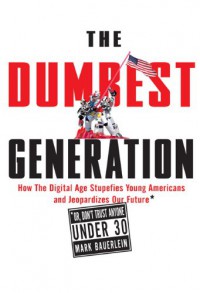Currently reading
Take Down
Leading an Inspired Life
Shadow Of The Titanic
The New Annotated H. P. Lovecraft
The Emperor's Blades
Grave Peril
Words of Radiance
11/22/63
Extra Virginity: The Sublime and Scandalous World of Olive Oil
You Are Not So Smart: Why You Have Too Many Friends on Facebook, Why Your Memory Is Mostly Fiction, and 46 Other Ways You're Deluding Yourself
The Dumbest Generation: How the Digital Age Stupefies Young Americans and Jeopardizes Our Future (Or, Don't Trust Anyone Under 30)
 The Dumbest Generation's premise is that today's kids are sorely equipped to handle the challenges of the lives they have ahead of them. The primary reason behind this, Bauerlain states, is that this upcoming generation (broadly people under 30 but more specifically people in high school) spend an ever decreasing amount of time reading. This rationale should come as no surprise when you consider that the author is an English professor. The author sees this decline first-hand in the classroom and makes it his mission to inform people of the situation.
The Dumbest Generation's premise is that today's kids are sorely equipped to handle the challenges of the lives they have ahead of them. The primary reason behind this, Bauerlain states, is that this upcoming generation (broadly people under 30 but more specifically people in high school) spend an ever decreasing amount of time reading. This rationale should come as no surprise when you consider that the author is an English professor. The author sees this decline first-hand in the classroom and makes it his mission to inform people of the situation.Because of the younger generation's short tether with all things digital and their apparent widespread disdain with "old fashioned" learning through books they have become a population of short attention-spanned narcissists, satisfied in only the here and now, their naively inflated self-importance, and with the spread of their most trivial inner thoughts and feelings through channels like MySpace and Twitter. Bauerlain broadens his argument to include the whole Internet, claiming that it not only encourages impatience and uneven reading patterns but it also allows for kids to lazily address today's questions with quick hit searches on sites like Wikipedia.
Bauerlain supports his argument very well throughout the book with copious amounts of data, from which he draws pretty sensible conclusions. I plant myself firmly in his camp though I am easier to convince than many as I see this first-hand evidence of this myself in the workplace -- or at least the results of the reading-decline epidemic. Many of these impatient up and comers demonstrate a lack of focus, a strong sense of entitlement, a poor work ethic, and -- most importantly -- their thirst for continued learning virtually dried up. Knowledge is not typically sought out and needs to be delivered in easy-to-swallow packets, on their schedule, and in forms most convenient to them -- traits that I'd argue are not abundantly present in voracious readers.
I thought the book fell somewhat short on providing solutions, preferring instead to state the accusation and spend many of its subsequent pages backing up the claim with data and repetitive statement of the problem. It's not enough to just point to the problem. To fully hit it head-on we need to be more constructive and not stop short of voicing suggestions.












